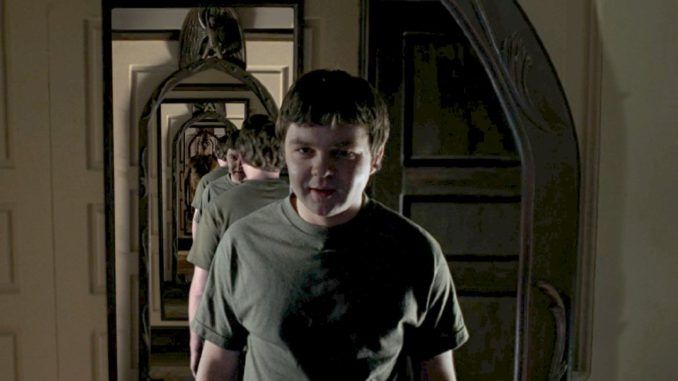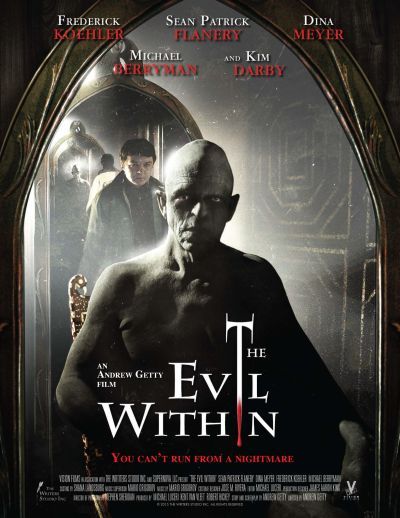
Rating: B
Dir: Andrew Getty
Star: Frederick Koehler, Sean Patrick Flanery, Dina Meyer, Brianna Brown
This film feels like it was made over a 15-year period, by a meth addict with mental issues, and considerably more money than sense. There’s a reason for that: because it was. The writer-director was a grandson of J. Paul Getty, founder of Getty Oil, and in 2002 began to put considerable amounts of his own money into a film production, then called The Storyteller, and inspired by Getty’s childhood nightmares. Another inspiration was… uh, the Son of Sam killings, in particular David Berkowitz’s claim he received orders from a talking dog. What if, mused Getty, there genuinely was a demon giving somebody orders to kill, which proved impossible for the victim to ignore?
Filming took a long time to complete, much of the shooting taking place in the reclusive Getty’s home, a mansion up in the Hollywood hills. For various reasons, including funding running out and health problems among the cast, production would intermittently rumble on for five years. Few beyond Getty and Koehler were part of proceedings for the whole process, in front of or behind the camera. It’s estimated that the director ploughed around five million dollars into the movie, including spending on sets, effects and camera rigs. But even after shooting was finished, post-production dragged on for even longer than the shoot, Getty tinkering with elements right up until March 31st, 2015. Which is when he died at age 47, of intestinal bleeding exacerbated by chronic methamphetamine use.
 Under other circumstances, the movie would never have seen the light of day. However, producer Michael Luceri continued with the project, completing the colouring and editing of the work, despite its auteur not being alive to see the finished product. It premiered in Portugal at the Fantasporto Film Festival on February 26th, 2017. Koehler, who had started work on the film when he was not long out of college, was 41 by the time it finally received a public screening. In addition to the director, supporting actor Matthew McGrory had also passed away – over eleven years prior to the premiere. This kind of self-funded, one-man project rarely ends well – see The Room for an example. Between that and the “unusual” production, I was braced for anything here.
Under other circumstances, the movie would never have seen the light of day. However, producer Michael Luceri continued with the project, completing the colouring and editing of the work, despite its auteur not being alive to see the finished product. It premiered in Portugal at the Fantasporto Film Festival on February 26th, 2017. Koehler, who had started work on the film when he was not long out of college, was 41 by the time it finally received a public screening. In addition to the director, supporting actor Matthew McGrory had also passed away – over eleven years prior to the premiere. This kind of self-funded, one-man project rarely ends well – see The Room for an example. Between that and the “unusual” production, I was braced for anything here.
And in many ways, this is not a “good” movie – at least, in conventional terms. However, it’s the kind of film which could probably only have been made by one man on a mission, dedicated to his work, and really not caring what anyone else thought. Normally, that would be a problem, but given the off-center nature of the story here, involving dreams, mental illness and brain injuries… Y’know what? It works, the whole mess at least possessing a consistency of tone which holds it together. Admittedly, that tone is best described as “barking mad”. I mean, you get to see someone drill a hole in their victim’s skull, so they can insert a fire extinguisher and let it off inside the poor bastard’s head.
The main character is Dennis (Koehler), a young man who is mentally disabled, to the point of being unable to care for himself. As a result, he lives with his older brother, John (Flanery) in their family mansion. This puts a cramp on John’s style, but he is in a relationship with Lydia (Meyer). Together they take Dennis out, such as excursions the local ice-cream store, where Dennis has a crush on an assistant there, Susan (Brown). One day, John puts a mirror in Dennis’s room, causing him to freak out because it’s the same mirror he saw the previous night in a nightmare. John insists the mirror stays, despite Dennis’s protests. Turns out he’s right to be concerned, because Dennis’s reflection starts talking to him, as soon as John leaves.
One of the main concerns I’ve read is the fact an able-bodied actor is playing a mentally-challenged character (I guess we need to call this “tard-face”?). However, it seems a necessity here, because the mirror version of Dennis is normal. Evil, but eloquently spoken, and a genuinely disabled actor would not be able to pull this off. Rather more questionable, I suspect, is the way this blurs the line between mentally disabled and mentally ill. For mirror Dennis gradually convinces real Dennis to carry out a gradually escalating series of violent acts, beginning with killing a cat, then escalating to a child, before focusing on those who are nearest and dearest to him.
 To be fair, real Dennis isn’t happy about it, but is unable to resist the demands of his silver-tongued reflection. These debates are somewhat reminiscent of the conversations Gollum has with himself in Lord of the Rings, but once you get past muttering “My PREH-shusssssss…” under your breath, it’s quite effective, courtesy of an impressive performance from Koehler. For someone who never appears to have worked on anything else, or have any formal training, Getty has a remarkably assured visual style. Right from the start, at an amusement park in the middle of the desert (above), the film has a look and feel all its own, which merges reality with… well, whatever Dennis is experiencing, to good effect. The floor-show which represents the film’s climax is like Baz Luhrmann on crack. Or meth.
To be fair, real Dennis isn’t happy about it, but is unable to resist the demands of his silver-tongued reflection. These debates are somewhat reminiscent of the conversations Gollum has with himself in Lord of the Rings, but once you get past muttering “My PREH-shusssssss…” under your breath, it’s quite effective, courtesy of an impressive performance from Koehler. For someone who never appears to have worked on anything else, or have any formal training, Getty has a remarkably assured visual style. Right from the start, at an amusement park in the middle of the desert (above), the film has a look and feel all its own, which merges reality with… well, whatever Dennis is experiencing, to good effect. The floor-show which represents the film’s climax is like Baz Luhrmann on crack. Or meth.
It’s the overall plot which is the problem, and I suspect this is where the excruciating and drawn-out timeline may have been a major factor. There’s a thread about a social worker which seems largely pointless, and in many ways, the same could be said about the whole relationship between Dennis, John and Lydia. While we learn about why John feels so responsible for his brother, this happens so late on as to rob it of much impact, because it feels like an afterthought. It’s not enough to derail the overall unchecked madness on display, and as one-man vanity projects go, this has to be considered as among the most interesting to watch. I was left genuinely wishing Getty had survived long enough, to be given the chance to direct again.
